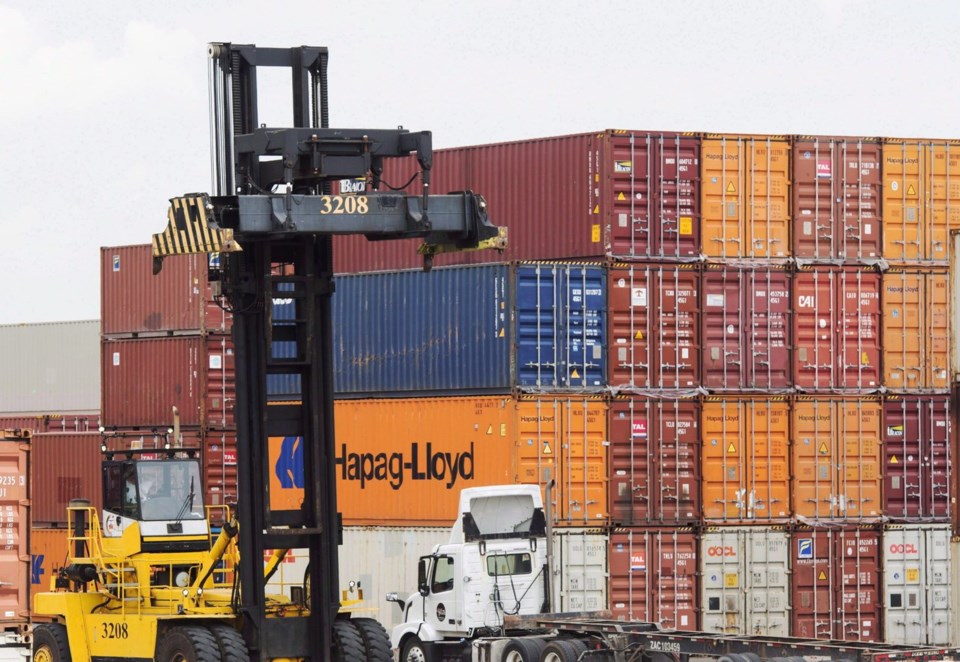MONTREAL — Importers are warning that the launch of a new online payment regime this week will cause financial headaches and logistical snarls for shippers bringing goods into Canada.
Fresh rules come into force Tuesday that require businesses importing products into the country to post a security deposit, among other financial commitments.
As of last week, only about 30 per cent of the country’s more than 190,000 active importers had registered with federal authorities to do so, according to information provided to customs brokerage groups by the Canada Border Services Agency and obtained by The Canadian Press.
"It's going to be an absolute mess," said Lisa McEwan, co-owner of customs brokerage firm Hemisphere Freight.
Until now, importers have enjoyed a system of "release prior to payment" (RPP) where goods are cleared at the border without taxes and duties being paid immediately on entry.
But the new RPP rules require a cash deposit or a guarantee known as a surety bond to secure release. Ushered in under a new online portal for border tax and tariff collection, the stricter regime known as CARM aims to make sure the government can collect even if the shipper fails to come up with the cash, such as in bankruptcy cases.
"New importers are already going through so many hoops with this CARM and getting registered," McEwan said.
"Each of those things are a cost and a hassle and that impacts the cost to consumers."
The deposit comes on top of tariffs facing many shippers for the first time this year after U.S. President Donald Trump set off a trade war.
One of McEwan's clients recently found she owed $32,000 in duties on a $150,000 shipment of light fixtures. Others who ship in clothing, beauty products and air conditioners have also been hit hard.
The higher tariff can mean bigger customs bonds or cash deposits under the new payment system, since the tallies are calculated based on the monthly taxes and fees owing on shipments.
Some took issue with those metrics. For those who haven't posted a bond, the cash deposit is based on the largest of a company's monthly loads over the past year, said Winnipeg-based customs broker Alan Dewar.
"My highest month was $5,000 (in taxes and duties), but every other month is, like, $100 because I just do a lot of business around Christmas," he said, citing the example of a client.
"That $5,000 comes out of my cash flow, to just sit there until I decide to close my business."
Importers who fail to enroll will have to show up in person and pay duties and taxes on the spot.
“We’re already seeing disruptions to supply chains and cross-border trade. Now is not the time to push for these changes,” said Corinne Pohlmann, head of advocacy at the Canadian Federation of Independent Business, in a release last week.
"Smaller importers, especially those importing only once or twice a year, would rather have an option of paying with a credit card on file than provide a cash deposit or buy a yearly security bond.”
The federal government’s digital platform for paying duties — called the Canada Border Services Agency Assessment Revenue Management project, or CARM — marks a broader effort to streamline the old, paper-based process that customs officials relied on for decades.
The agency has said the portal will smooth out cross-border transport by offering tens of thousands of shippers direct access to their information, and a user-friendly platform for submitting documents while shoring up enforcement.
Though only a minority of importers have enrolled in the RPP portion, those that have signed up account for more than 80 per cent of goods brought into the country, according to the CBSA.
The agency has reached out with repeated reminders about rules and deadlines phased in since April 2024.
Importers who have not set up a CARM account have until October to have a customs brokerage swap in its own business number as an interim measure.
Registering typically takes 10 minutes and can be done online or in-person at a border crossing, brokers and the CBSA noted.
McEwan, nonetheless, stressed the new payment requirements are a “hindrance.”
"People are throwing in the towel,” she said.
This report by The Canadian Press was first published May 19, 2025.
Christopher Reynolds, The Canadian Press



